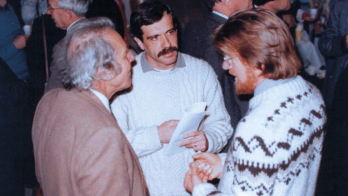by Steven Weinberg, Belknap Press/Harvard University Press. Hardback ISBN 9780674035157, $25.95.

This book collects some essays and book reviews written by Steve Weinberg between the years 2000 and 2008. They were written in his study at home, from where the author can see Lake Austin. In 25 chapters he covers an impressive number of subjects ranging from military history to his review of Richard Dawkins’ book The God Delusion, passing through fundamental physics, missile defence, the boycott of Israeli academics and even offering some advice to young students and postdoctoral fellows.
As with previous books, one is captivated by the depth and breadth of his knowledge, the elegance of his prose and his intellectual honesty. In each chapter there is a preamble where he explains the origin of the article, whether it was asked for by different journals or as an exposition to a learned society; an afterword reveals some of the reactions his views have elicited.
An important part of the book is dedicated to the current theory of multiverses and string landscapes. To a certain extent all of these developments were inspired by his remarkable work in the late 1980s (explained in the book) where he used anthropic reasoning to understand (if not explain) the possible value of the cosmological constant, also known as the dark energy of the universe. It is quite remarkable that the value derived from the observations carried out by groups studying galactic redshifts, as well as from the Wilkinson Microwave Anisotropy Probe satellite, are in good agreement with the values favoured by his analysis. The sections of the book describing this work, dealing with Einstein’s famous blunder, are a masterpiece of insight and deep mastery of physics.
In other chapters, covering the humanities or religion, he takes his usual “rationalist, reductionist, realist and devoutly secular” viewpoint. Unlike Dawkins, his discourse is not the one of a “born-again atheist” (my quotes), but rather he explains his point of view in a relaxed form not devoid of humour. The effect of the relevant chapters is probably much stronger in US society, where religion plays a much bigger role than in Europe, where a large number of scientists, humanists, politicians and ordinary citizens would easily agree with his discourse. He raises provocation to the level of an art.
Another theme addressed in these essays is the ongoing discussion with philosophers or theologians on the notion of whether science explains only the “how” and not the “why” of things. He makes it very clear that the laws of nature have no purpose, and that the only legitimate purpose of science is to understand the basic laws that rule the universe. Finality is not the aim of science, but that does not make it a lesser element in the human endeavour to understand the universe that we live in.
Weinberg has not lost his punch. Far from that. This book is thought provoking, informative, challenging and fun to read. A single fault: it is too short.







